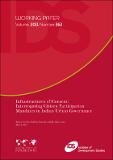Infrastructures of consent: interrogating citizen participation mandates in Indian urban governance

Download
Date
2011-05Author
Coelho, Karen
Kamath, Lalitha
Vijaybaskar, M
Metadata
Show full item recordImpact
Abstract
How does the state ‘perform’ people’s participation and public consultation exercises in a context where it is increasingly forced to rely on private capital to build infrastructure? How do these new forms of participation and consultation articulate with existing institutions of people’s representation? Are the new mandates for citizen participation and public consultation that are written into the reform agenda driving a further wedge into the already fractured citizenship that characterizes the Indian urban polity? These are the questions posed by this paper. While ‘participatory development’ itself has come under critique since the late 1990s for its demonstrated effects of disenfranchising marginalised groups, manufacturing consensus for plans already made, and/or closing off alternative pathways for transformation, this paper argues that contemporary practices of public consultation and citizen participation have moved out of the ambit of such critiques. No longer do they contain more than tokenistic gestures toward broad inclusion or people’s empowerment. Instead, the imperatives of ‘fast-tracking’ India’s cities into a post-Third World regime of ‘global cities’, have given new shape and meaning to contemporary practices of participation and consultation. The paper explores notions of participation as located in ‘second generation’ or institutional reforms, particularly as articulated by prominent state-sponsored public-private partnerships such as the Bangalore Agenda Task Force (BATF) and the Tamilnadu Urban Development Fund (TNUDF). These ‘model’ partnerships provided key programmatic elements that became the basis of national reform programs, notably the Jawarharlal Nehru National Urban Renewal Mission (JNNURM). The paper also discusses the emerging character of collective action in Indian cities in terms of its implications for the unfolding of governance reform measures such as the JNNURM’s Community Participation Law.
Citation
Coelho, K., Kamath, L and Vijaybaskar, M. (2011) 'Infrastructures of Consent: Interrogating Citizen Participation Mandates in Indian Urban Governance', IDS Working Paper 362, Brighton: IDSIs part of series
IDS Working Paper;362More details
http://www.ntd.co.uk/idsbookshop/details.asp?id=1217Library catalogue entry
http://bldscat.ids.ac.uk/cgi-bin/koha/opac-search.pl?q=rn:324038Rights holder
Institute of Development StudiesCollections
- IDS Research [1671]
